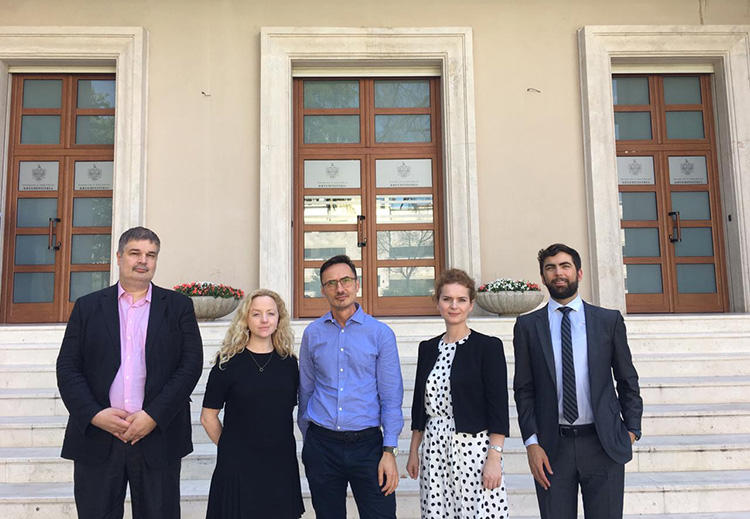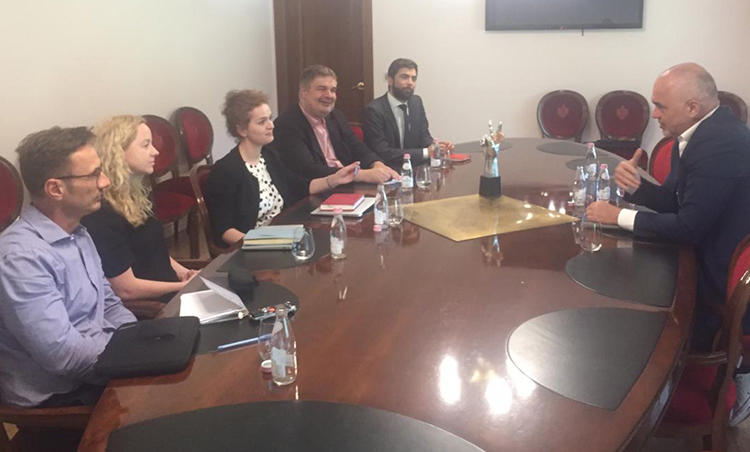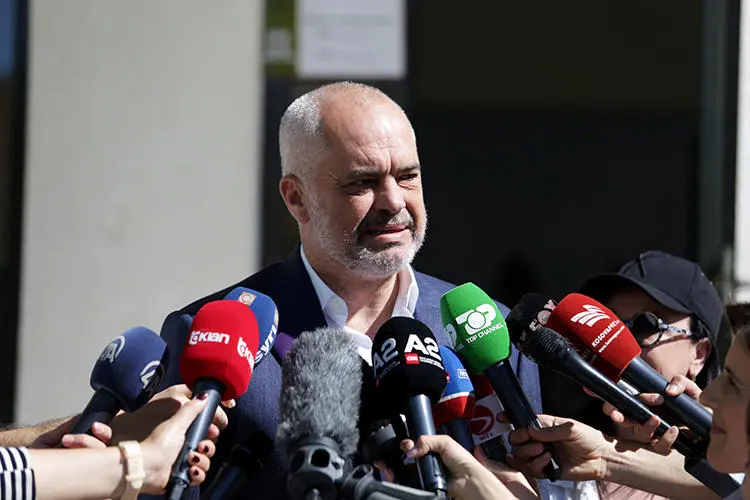The intersection of organized crime, corruption and politics in Albania is impacting the country’s press. During a joint mission by a coalition of press freedom organizations to Tirana in June, CPJ Europe Correspondent Attila Mong spoke with journalists about challenges including threats, attacks, political interference, and legal harassment.
Klodiana Lala’s two baby daughters were asleep in her father’s home when someone sprayed the house with automatic gunfire in the early hours of August 30, damaging the walls and windows. No one was injured, but the News 24 TV reporter, who was away at the time, said the attack impacted her whole family. “We are still devastated and my daughters traumatized,” she told me in Tirana in June. “Our family is really simple, we have never had any trouble with anyone”.
Nearly a year later, no one has been arrested. Lala said the only motive she can think of for the attack is her reporting on apparent links between organized crime and politics, which this year earned her an international award.
“Journalists here are walking on a minefield, and the biggest risk is when they do not realize on whose toes they are treading while doing their investigations,” Besar Likmeta, an investigative reporter for the Balkan Investigative Reporting Network (BIRN), a regional network of non-governmental organizations, said when we met to discuss the attacks and threats against Albanian journalists.
Conversations with journalists and political leaders, including Prime Minister Edi Rama, during a press freedom mission revealed a worrying situation: physical attacks against the press that go unresolved, public officials regularly using language that belittles critical reporters, and proposed legislation on local and foreign online outlets that is out of line with European and international human rights standards.

Added to this, journalists must navigate the complexity of reporting in a country whose political system, business elite and even parts of its media industry are intertwined with organized crime groups. The Guardian, Deutsche Welle, Vice and others have reported on how Albanian gangs produce and distribute drugs in Europe,, bringing huge amounts of cash into the country of less than 3 million people, which they then allegedly channel into Albania’s political system by ways of murky party financing. An Open Society Foundation report on organized crime in Albania in 2016 found that businesses and sometimes even media companies benefit from “dirty money” through investment and advertising. Obscure campaign financing affects media companies in other ways too: BIRN reported last month on the practice of selling news content via paid for appearances or mentions is a regular practice.
So much money flows into the country’s banks that it has to be flown abroad weekly, because the central bank does not accept the deposits. In April, an armed group raided an Austrian Airlines, stealing millions of euros. When leaving Tirana, I took the same Friday afternoon flight bound for Vienna, and observed the line-up of armored vehicles filled with money, and police equipped with machine guns, guarding the process.
The government regularly denies allegations of corruption and connection to organized crime.
A U.S. State Department report released in March provided a grim assessment of Albania, saying that the country “made no significant progress toward thwarting money laundering and financial crimes” last year.
Fatos Lubonja, a writer summed up the issues more eloquently, telling me, “Imagine Albania as a three-story house, with organized crime in the basement, business, oligarchs owning also media on the first floor, and the political parties on the second. And there are stairs and elevators connecting these floors.”
Those who cross certain lines can easily find themselves without jobs, as happened to Alida Tota and Artan Rama, two prominent journalists who separately investigated alleged links between the municipality of Tirana, controlled by Socialist party mayor Erion Veliaj, and a recycling plant in the city’s Sharra landfill, where a 17-year-old worker died in 2016. Rama’s show on Vision Plus TV was canceled on the day it was due to broadcast the investigation in October 2016, leaving the journalist without a job, Balkan Insight reported. In a Facebook post, his show described the action as an act of censorship, according to the report. That same year, Tota, who reported on the same case, was fired from A1 News TV a few hours after she contacted the mayor’s office for comment.
“After my investigation, all the doors closed in front of me in mainstream media, and I also received death threats” Tota told CPJ, adding that she had to leave journalism and even Albania for a short period, taking her family into exile to Sweden out of fear of threats. She sued her TV station for illegal dismissal and overdue salaries, and won the case in 2017, but never returned to journalism. While the court found in Tota’s favor, it dismissed her claim that she was fired in relation to the investigation.
Rama who also spoke with CPJ, now works as a freelance reporter outside the mainstream media, a tough business in the Albanian market dominated by big players. In an email to CPJ, Vision Plus TV said that Rama left the channel of his own will. The station denied that the show was censored because of its content, Balkan Insight reported at the time.
In a July 9 email to CPJ, the mayor’s office said, “The municipality of Tirana rejects any allegations that may have been made against it and the Mayor of Tirana regarding the cases of journalists Alida Tota and Artan Rama.” The email added, “The municipality of Tirana condemns the violence of any form expressed to the media and/or journalists. We strongly support the idea that a free and independent media helps to improve the work of public institutions and we see journalists as our collaborators in raising citizens’ concerns and improving our daily work.”
Foreign reporters are not exempt from pressure. Earlier this year, Alice Taylor, a British journalist based in Tirana, was harassed by pro-government media that accused her of publishing propaganda against Albania and having Russian links, after she made critical comments on government corruption. “I was harassed on social media, shouted at in the street, I was terrified and even had a friend accompanying me for almost three weeks,” she told me.
Louis Sellier, a French freelance reporter, told me that Albania’s ambassador in Paris put pressure on one of his employers, the French daily Libération, after his critical report on allegations of government corruption and organized crime was published in February. In a letter to Libération, seen by CPJ, and signed Ambassador Dritan Tola, Sellier was accused of “impartiality” and the letter appeared to hint that the journalist was not the right person for the daily to hire in Tirana, saying, “presenting him as Libération’s correspondent is problematic.”
In an email to CPJ, Tola confirmed that he corresponded with and met Libération’s team in Paris to express concerns over the “too simplistic, if not caricatured representation of the country by the newspaper” and Sellier’s “unbalanced” reporting,” which he said was “depicting a very dark and gloomy Albania.” Tola denied putting pressure on the paper or suggesting that it replace Sellier.
In a separate case, Prime Minister Rama announced that he has hired a German lawyer to sue Peter Tiede, a reporter for the German daily Bild, after the newspaper published a series of intercepted audio recording that appeared to show how a drug-trafficking ring pushed a favored person to become a ruling party MP in the 2017 general elections. Earlier this year, BIRN and Voice of America published a joint investigation into how criminal gangs allegedly meddled with the 2017 general elections and some local elections in 2016.
“Imagine if all this can happen to foreign reporters here, what Albanian journalists must endure,” said Mimoza Kociu, from the Association of Professional Journalists of Albania. Kociu, who met with the press freedom mission, described defamation cases filed by politicians, often requesting disproportionate sums in damages, and online harassment of critical reporters, often prompted by a politician’s comments or pro-government press coverage.
Unsurprisingly, many Albanian journalists chose to stay far from delicate issues: A 2015 report by BIRN found over half the 121 journalists surveyed said they often or sometimes avoided stories, with crime and politics being the biggest areas of avoidance. Exacerbating the issue is Albania’s media market in which half of the audience share and 90 percent of revenue share is controlled by four powerful families, as other studies by non-profits, including the Tirana based Institute for Development, Research and Alternatives, have shown.

When I challenged Prime Minister Rama, who received the joint press freedom mission in Tirana, he was dismissive of the threats to journalists. “I cannot stand these fake heroic gestures, (…) playing the diva,” he said, when presented with the mission’s findings.
He defended his negative rhetoric against journalists: Rama regularly refers to reporters as “kazan” (trash bins), and the leader of the opposition, Lulzim Basha, refers to the media as “captured and bought,” the mission found. Such language, as we discussed with Rama, denigrates journalists and makes them appear to be a legitimate target for aggression, increasing the risk of threats or violence against them. By the end of our meeting Rama seemed to be convinced by our arguments, and committed to no longer calling journalists “kazan”.
Despite international criticism, Rama vowed to push forward with legislation–which he often calls an anti-slander package–that would introduce mandatory registration requirements for online media and create an administrative body with the power to levy high fines and shut down online media and block foreign online media without a court order. A first draft was presented in December, without proper consultation with journalists and civil society groups. Rama told us the two amendments were important to discipline online media, which, he said, often defamed politicians. Rama said the updated draft will eliminate the possibility of shutdowns and lower fines.
On a positive note, he said he would consider fully repealing criminal defamation laws. Prison sentences for defamation were repealed in 2012, but it remains a criminal offences punished by a fine. In recent years, Albania has seen proposals to reintroduce laws against defaming top state officials. Rama said that personally, he would not use the law against journalists, but in “extreme cases” he would continue to bring civil defamation cases against journalists.
While the mission was in Tirana, the European Union announced that it would delay opening accession talks with Albania amid concerns of lingering corruption. In meeting with diplomats from member states for background talks in Tirana, they said that the press freedom situation is monitored closely. The latest progress report by the EU had highlighted Albania’s “limited progress” on press freedom, which–as one of diplomat said–can be understood as criticism in the EU’s language.
[Reporting from Tirana]
[EDITOR’S NOTE: This blog post has been updated to include comments from the mayor’s office.]
